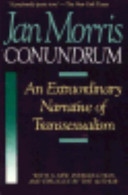I decided to read Jan Morris’ Conundrum because Jennifer Finney Boylan referenced the book in She’s Not There: A Life in Two Genders. I love Boylan, but hate Morris. Conundrum is only 174 pages, but I found her intolerable for more than 100 pages, and it took me a long time to get through the ordeal. Initially I thought that maybe it was the prose style of her era, but dismissed that when I realized that I enjoyed her contemporaries. Just because you’re progressive in one area doesn’t mean you’re progressive in others.
Here are some quotes. On homosexuality: “A marriage as loyal as marriage could be had ended sterile and uncreative; and if the two of them had lived into old ages, I think, would have proved progressively more sterile still, the emptiness creeping in, the fullness retreating. (pg. 62)” Why? They don’t have children. So while unintentionally swiping at two gay male friends, Morris unintentionally also dismisses any heterosexual relationship or person without kids.
Morris also finds her concept of female authority not enjoyable to work under. “I have a disconcerting feeling now that I disliked it because it was like working for a woman rather than a man. (pg. 68)” This disdain is repeated frequently, and Morris glories in the company of men, which is fine, but betrays a certain prejudice against women in power based on her prejudices.
On Africans: “I began to see behind the crudities and irrational of African life far deeper realities. (pg 100)” Oh, thanks. Morris sees this as a positive because before she “found the black African as incomprehensible as a man from the moon-certainly far more alien to me than my cat or my sheepdog Sam-and while I knew intellectually that black people were as diverse as white, that there were good and bad Africans, wise and foolish, that they bled or wept like Jews or Welshmen, yet emotionally I viewed them as one people, and did not trust their values. (pg. 99)” Bear in mind that Morris spent part of her life as a travel writer, but doesn’t EVER specify a country, just a continent. Please note that Morris was successful as a travel writer and shudder in horror.
Morris is only tolerable and interesting when she discusses her transition. Unfortunately even as she acknowledges sexism and her frustration, she also adapts by playing the part of a helpless woman. “If I was assumed to be incompetent at reversing cars, or opening bottles, oddly incompetent I found myself becoming. (pg. 149)” She is THAT kind of woman-a woman who can affirm gender norms/stereotypes and benefit by enjoying the “courtesies (pg. 150)” only available to certain types of women-women of a certain class, race and/or country. Must be nice.
The worst part is that Morris fancies herself as objective an observer of the human condition as possible. “From the beginning of my life I had felt that my state of detachment gave me a privileged view of things….It was hardly an objective view……, but it was always uninvolved….I was a good reporter, because I was tightly circumscribed (pg. 154).” Oh honey, you are the least objective person. I’m happy that you can finally be yourself, but you should be a little less happy who that self is.

Conundrum
Stay In The Know
Join my mailing list to get updates about recent reviews, upcoming speaking engagements, and film news.




